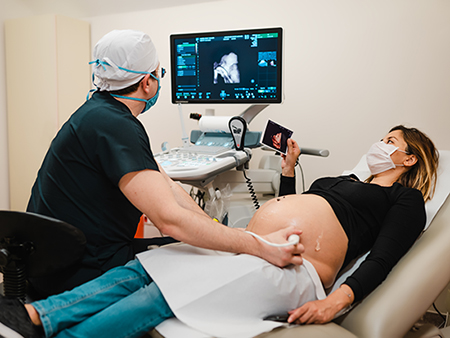Editor's Note: The information published in this story is accurate at the time of publication. Always refer to uab.edu/uabunited for UAB's current guidelines and recommendations relating to COVID-19.
 To better understand how COVID-19 affects a pregnant woman and her baby, researchers at UAB are enrolling patients in two studies to determine the short- and long-term impacts.For at-risk populations, understanding how COVID-19 can impact the health and well-being of a patient is still questioned. For pregnant women who are exposed to and acquire COVID-19, it is still hard to determine the short- and long-term impacts of the virus on both mother and baby during and after pregnancy.
To better understand how COVID-19 affects a pregnant woman and her baby, researchers at UAB are enrolling patients in two studies to determine the short- and long-term impacts.For at-risk populations, understanding how COVID-19 can impact the health and well-being of a patient is still questioned. For pregnant women who are exposed to and acquire COVID-19, it is still hard to determine the short- and long-term impacts of the virus on both mother and baby during and after pregnancy.
Researchers in the University of Alabama at Birmingham Center for Women’s Reproductive Health are enrolling and/or following patients in two studies to better understand COVID-19’s impact on this population, in hopes of directing future public health and clinical guidance in the future.
“Researchers at UAB and across the world have been working tirelessly to better understand COVID-19 since the pandemic began, and pregnancy is no exception,” explained Ashley Battarbee, M.D., MSCR, assistant professor in the Department of Obstetrics and Gynecology. “We have partnered with the CDC and other sites across the country to learn more about how COVID-19 impacts moms and their babies during pregnancy. We hope women will see this as an opportunity to contribute during such a devastating pandemic and help us learn how we can protect and care for mothers in the near future.”
ESPI – Electronic Cohort Study
The ESPI study through the Centers for Disease Control and Prevention will enroll women at less than 28 weeks’ gestation at three sites, including UAB, and follow their health through the conclusion of their pregnancy and delivery. The study will collect information from medical records of women who received prenatal care and reached the end of their pregnancy, in hopes of estimating the incidence of asymptomatic and symptomatic COVID-19 infection. Furthermore, researchers hope to better understand the characteristics of infection in pregnant women, including the spectrum of illness and risk factors for infection and severe illness.
In this study, women will self-test weekly via nasal swab for COVID-19 and engage with weekly text-message communication about their symptoms, pregnancy experience and other aspects of their care.
Maternal Morbidity and Mortality During the COVID-19 Pandemic
Understanding COVID-19’s impact on maternal mortality is paramount as the pandemic continues. Funded by the Eunice Kennedy Shriver National Institute of Child Health and Human Development, this cohort study will review outcomes of 24,400 deliveries in women on randomly selected days in 2019 and 2020, and all confirmed COVID-19 infections among pregnant or immediately postpartum women in 2020. It is suspected that maternal morbidity and mortality may be higher among pregnant women with COVID-19 infection compared to those without infection during the same window of time, and this study will evaluate those rates.
The study’s three primary objectives include:
- Evaluating whether pregnant or immediately postpartum women experience higher maternal morbidity and mortality during the COVID-19 pandemic than before the pandemic
- Evaluating whether women with COVID-19 infection, both in- and outpatient, have higher maternal morbidity and mortality than pregnant women without COVID-19 infection
- To describe maternal and neonatal outcome data for all pregnant and immediately postpartum women with a confirmed COVID-19 infection and contribute these data to an NICHD COVID-19 pregnancy registry
The study will take place at 12 clinical centers that make up the NICHD Maternal-Fetal Medicine Units Network, including UAB.
For more information about enrolling in or learning more about COVID-19 in pregnancy clinical trials, contact MFMResearchRecruit@uabmc.edu.